- Home
- Fredric Brown
The Fabulous Clipjoint
The Fabulous Clipjoint Read online
Copyright
The Fabulous Clipjoint
Copyright © by 1947 by Fredric Brown
Cover art and eForeword to the electronic edition copyright
© 2000 by RosettaBooks, LLC
All rights reserved. No part of this book may be used or reproduced in any manner whatsoever without written permission except in the case of brief quotations embodied in critical articles and reviews.
For information address
[email protected]
First electronic edition published 2000 by RosettaBooks LLC, New York.
ISBN 0-7953-0376-9
Contents
eForeword
Cast of Characters
Chapter 1
Chapter 2
Chapter 3
Chapter 4
Chapter 5
Chapter 6
Chapter 7
Chapter 8
Chapter 9
Chapter 10
Chapter 11
Chapter 12
Chapter 13
Chapter 14
eForeword
Fredric Brown’s The Fabulous Clipjoint, published in 1947, signaled the beginning of a brilliant career as a novelist for a writer who had been writing pulp fiction for over a decade. Brown introduces an unlikely pair of amateur sleuths in 18-year-old Ed Hunter and his Uncle Ambrose, in pursuit of the murderer of Ed’s father on the streets of Chicago. The Fabulous Clipjoint won the 1947 Edgar Award for Best First Novel from the Mystery Writers of America, and it was the first of a series of Brown novels about the exploits of Ed and Ambrose Hunter.
A writer equally at home in science fiction and mystery, Fredric Brown (1906-72) had published dozens of pulp-fiction stories before writing The Fabulous Clipjoint, while working as a proofreader for the Milwaukee Journal. His writing still stands out for its engaging, free-flowing style and the clockwork brilliance of his plots. Since he had worked in offices throughout the Midwest after dropping out of college, the Cincinnati native absorbed a tremendous amount of detail that later turned up in his stories, lending them a naturalism that only heightened their credibility and suspense. Brown published some 22 books after the success of The Fabulous Clipjoint, and he came to be a highly regarded master of the genre, sometimes compared to Cornell Woolrich. In the mid-1980s, his vast output of detective stories — published in Ellery Queen’s Rogue’s Gallery, Adventures in Time and Space and other periodicals and anthologies — was collected for the first time in a definitive edition numbering 16 volumes.
RosettaBooks is the leading publisher dedicated exclusively to electronic editions of great works of fiction and non-fiction that reflect our world. RosettaBooks is a committed e-publisher, maximizing the resources of the Web in opening a fresh dimension in the reading experience. In this electronic reading environment, each RosettaBook will enhance the experience through The RosettaBooks Connection. This gateway instantly delivers to the reader the opportunity to learn more about the title, the author, the content and the context of each work, using the full resources of the Web.
To experience The RosettaBooks Connection for The Fabulous Clipjoint, go to:
RosettaBooks.com/
TheFabulousClipjoint
| Go to Contents |
Cast Of Characters
Ed Hunter: he went after his father’s killer.
Wally Hunter: a quiet drinker and a quiet man.
Madge Hunter: Wally’s wife, poison to all men, but she liked her stepson, Ed.
Gardie Hunter: her daughter, a man-crazy gal.
Am Hunter: Wally’s brother and one-time private dick.
Bunny Wilson: Wally’s co-worker, the only one of Wally’s friends Madge ever liked.
Hank: just a cop.
Hoagy: sex-spieler at the carnival.
Bassett: a dick from homicide, neither dumb nor honest.
Kaufman: a short, heavy-set barkeep with arms hairy as a monkey’s.
Bobby Reinhart: a sleek little punk who thought he was a lady killer.
Dr. William Haertel: coroner’s physician.
Dutch Reagan: common everyday hood.
Benny-the-Torpedo: he’s another.
Claire Raymond: the kind of gal men can’t help making passes at. Her phone number — Wentworth 3842.
| Go to Contents |
Chapter 1
In my dream I was reaching right through the glass of the window of a hockshop. It was the hockshop on North Clark Street, the west side of the street, half a block north of Grand Avenue. I was reaching out a hand through the glass to touch a silver trombone. The other things in the window were blurred and hazy.
The singing made me turn around instead of touching the silver trombone. It was Gardie’s voice.
She was singing and skipping rope along the sidewalk. Like she used to before she started high school last year and got boy-crazy, with lipstick and powder all over her face. She was not quite fifteen; three and a half years younger than I. She had make-up on now, in this dream of mine, thick as ever, but she was skipping rope, too, and singing like a kid, “One, two, three, O’Leary; four, five, six, O’Leary; seven, eight …”
But through the dream I was waking up. It’s confusing when you’re like that, half one way and half the other. The sound of the elevated roaring by is almost part of the dream, and there’s somebody walking in the hallway outside the flat, and — when the elevated has gone by — there’s the ticking of the alarm clock on the floor by the bed and the extra little click it gives when the alarm is ready to explode.
I shut it off and rolled back, but I kept my eyes open so I wouldn’t go back to sleep. The dream faded. I thought, I wish I had a trombone; that’s why I dreamed that. Why did Gardie have to come along and wake me up?
I thought, I’ll have to get up right away. Pop was out drinking last night and still wasn’t home when I went to sleep. He’ll be hard to wake up this morning.
I thought, I wish I didn’t have to go to work. I wish I could take the train to Janesville to see my Uncle Ambrose, with the carnival. I hadn’t seen him for ten years, since I was a kid of eight. But I thought about him because Pop had mentioned him yesterday. He’d told Mom that his brother Ambrose was with the J.C. Hobart carney that was playing Janesville this week and that was the nearest they’d get to Chicago, and he wished he could take a day off and go to Janesville.
And Mom (who isn’t really my mom, but my step-mother) had got that looking-for-trouble look on her face and asked, “What do you want to see that no-good bastard for?” and Pop had let it go. Mom didn’t like my Uncle Ambrose; that was why we hadn’t seen him for ten years.
I could afford to go, I thought, but it would make trouble if I did. I figured like Pop did; it isn’t worth it.
I got to get up, I thought. I swung out of bed and went into the bathroom and spattered water into my face to get wide awake. I always used the bathroom and dressed first, and then I woke Pop and got us some breakfast while he got ready. We went to work together. Pop was a linotype operator and he’d got me on as an apprentice printer at the same shop, the Elwood Press.
It was a gosh-awful hot day, for seven in the morning. The window curtain hung as stiff as a board. It was almost hard to breathe. Going to be another scorcher, I thought, as I finished dressing.
I tiptoed along the hall toward the room where Pop and Mom slept. The door to Gardie’s room was open and I looked in without meaning to. She was sleeping on her back with her
arms thrown out and her face without any make-up on it looked like a kid’s face. A kind of dumb kid.
Her face, looking like that, didn’t match the rest of her. I mean, maybe because it had been such a hot night she’d taken off her pajama tops and she had nice, round, firm breasts. Maybe they’d be a little too big when she got older but now they were beautiful and she knew it and was proud of them. You could tell that by the way she wore tight sweaters so they would show.
She really is growing up fast, I thought; and I hope she’s smart because otherwise she’ll be coming home knocked up one of these days, even if she isn’t fifteen yet.
She’d probably left her door wide open on purpose so I’d look in and see her that way, too. She wasn’t my sister, really, see; not even a half sister. She was Mom’s daughter. I’d been eight and Gardie a snot-nosed brat of four when Pop had remarried. My real mom was dead.
No, Gardie wouldn’t miss a chance to tease me. She’d like nothing better than to tempt me into making a pass at her — so she could raise hell about it.
I went on past her open door thinking, damn her, damn her. There wasn’t anything else I could think or do about it.
I stopped in the kitchen long enough to light a fire under the kettle so it would start to boil for coffee, and then I went back and rapped softly on the door of their bedroom and waited to see if I’d hear Pop move.
He didn’t, and that meant I’d have to go in and wake him. I hated to go into their bedroom, somehow. But I knocked again and nothing happened, so I had to open the door.
Pop wasn’t there.
Mom was on the bed alone, asleep, and she was dressed all but her shoes. She had on her best dress, the black velvety one. It was awful mussed now and she must have been pretty tight to go to sleep with it on. It was her best dress. Her hair was a mess, too, and she hadn’t taken her make-up off and it was smeared and there was lipstick on the pillow. The room smelled of liquor. There was a bottle of it on the dresser, almost empty and with no cork in it.
I looked around to be sure Pop wasn’t anywhere at all in the room; and he wasn’t. Mom’s shoes lay in the opposite corner from the bed, quite a ways apart as though she’d thrown them there from the bed.
But Pop wasn’t there.
Pop had never come home at all.
I closed the door even more quietly than I’d opened it. I stood there a minute wondering what to do, and then — like they tell you a drowning man will grab at a straw — I started to look for him. Maybe he came home drunk, I told myself, and went to sleep somewhere in a chair on on the floor.
I looked all over the flat. Under the beds, in the closets, everywhere. I knew it was silly, but I looked. I looked I had to be sure he wasn’t anywhere there; and he wasn’t.
The water for coffee was boiling away now, spouting out steam. I turned off the fire under it, and then I had to stop and think. I guess I’d stalled by hunting, so I wouldn’t have to think.
I thought, he could have been with somebody, one of the other printers, maybe. He might have spent the night at somebody’s place because he got too drunk to get home. I knew I was kidding myself; Pop knew how to hold liquor. He never got that drunk.
But I told myself, maybe that’s what happened. Maybe Bunny Wilson? Last night was Bunny’s night off; he worked the night shift. Pop often drank with Bunny. A couple of times Bunny had stayed at our place; I’d found him asleep on the sofa in the morning.
Should I phone Bunny Wilson’s rooming house? I started for the phone, and then stopped. Once I started phoning, I’d have to go on. I’d have to phone the hospitals and the police and carry through with all of it.
And if I used the phone here, Mom or Gardie might wake up and — well, I don’t know why that would have mattered, but it would have.
Or maybe I just wanted to get out of there. I tiptoed out and down one flight, and then I ran down the other two flights.
I got across the street and stopped. I was afraid to phone. and it was almost eight, so I’d have to do something quick or be late to work. Then I realized that didn’t matter; I wasn’t going to work today anyway. I didn’t know what I was going to do. I leaned against a telephone pole and felt sort of hollow and light-headed as though I weren’t quite all there, not all of me.
I wanted it over with. I wanted to know and get it over with, but I didn’t want to go to the police and ask. Or was it the hospitals you called first?
Only I was afraid to call anybody. I wanted to know and I didn’t want to know.
Across the street, a car was slowing down. There were two men in it, and the one on the outside was leaning out looking at street numbers. It stopped irght in front of our place, and the two men got out, one on each side. They were coppers; it was written all over them, even if they didn’t wear uniforms.
This is it, I thought.
Now I’m going to know.
I went across and followed them into the building. I didn’t try to catch up; I didn’t want to talk to them. I just wanted to listen when they started talking.
I followed them up the stairs, half a flight behind. On the third floor one of them waited while the other walked down the hall and looked at numbers on doors. “Must be next floor,” he said.
The one at the head of the stairs turned and looked at me. I had to keep on coming. He said, “Hey, kid, what floor’s fifteen on?”
“Next one,” I said, “Fourth floor.”
they kept on going, and now I was only a few steps behind them. Like that we went from the third floor to the fourth. The one just ahead of me had a fat behind and his trousers were shiny in the seat. They stretched tight every time he took a step up. It’s funny; that’s all I remember about how they looked, either of them, except that they were big men and coppers. I never saw their faces. I looked at them, but I never saw them.
They stopped in front of fifteen and knocked, and I kept ongoing right past them and up the flight to the fifth, the top, floor. I kept on going until I reached the top and took a few steps, and then I reached down and pulled off my shoes and went back halfway down the stairs, keeping out of sight back against the wall. I could hear and they couldn’t see me.
I could hear everything; I could hear the shuffle of slippers as Mom came to the door; I could hear the door creak just a little as it opened; and in the second of silence that followed, I could hear the ticking of the clock in the kitchen through the opened door. I could hear soft, barefoot steps that would be Gardie coming out of her room to the turn in the hall by the bathroom where, without being seen, she could here who was at the door.
“Wallace Hunter,” said one of the coppers. His voice was rumbly like an el car a long way off. “Wallace Hunter live here?”
I could hear Mom start breathing faster; I guess that was enough of an answer, and I guess the look on her face must have answered his “You — uh — Mrs. Wallace Hunter?” because he went right on. “ ‘Fraid it’s bad news, ma’am. He was — uh — ”
“An accident? He’s hurt — or —”
“He’s dead, ma’am. He was dead when we found him. That is — we think it’s your husband. We want you to come and identi — that is, as soon as you’re able. There’s no hurry, ma’am. We can come in and wait till you’re over the shock of —”
“How?” Mom’s voice wasn’t hysterical. It was flat, dead. “How?”
“Well — uh —”
The other copper’s voice spoke. The voice that had asked me what floor fifteen was on.
“Robbery, ma’am,” he said. “Slugged and rolled in an alley. About two o’clock last night, but his wallet was gone so it wasn’t till this morning we found out who — Catch her, Hank!”
Hank must not have been fast enough. There was a hell of a loud thud. I hear
d Gardie’s voice, excited, then, and the coppers going on in. I don’t know why, but I started for the door, my shoes still in my hand.
It closed in my face.
I went back to the stairs and sat down again. I put my shoes on, and then I just sat there. After awhile someone started down the stairs from the floor above. It was Mr. Fink, the upholsterer, who lived in the flat directly over ours. I moved close against the wall to give him plenty of room to pass me.
At the bottom of the flight, he stopped, one hand on the banister post and looked back at me. I didn’t look at him; I watched his hand. It was a flabby hand, with dirty nails.
He said, “Something wrong, Ed?”
“No,” I told him.
He took his hand off the post and then put it on again. “Why you sitting there, huh? Lost your job or something?”
“No,” I said. “Nothing’s wrong.”
“Hell there ain’t. You wouldn’t be sitting there. Your old man get drunk and kick you out or —”
“Let me alone,” I said. “Beat it. Let me alone.”
“Okay, if you want to get snotty about it. I was just trying to be nice to you. You could be a good kid, Ed. You oughta break away from that drunken bum of a father of yours —”
I got up and started down the steps toward him. I think I was going to kill him; I don’t know. He took a look at my face and his face changed. I never saw a guy get so scared so quick. He turned around and walked off fast. I stayed standing there until I heard him going down the next flight.

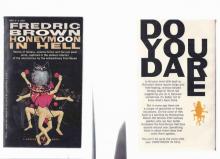 Hall of Mirrors
Hall of Mirrors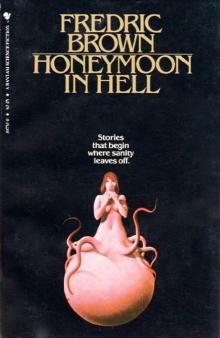 Honeymoon in Hell
Honeymoon in Hell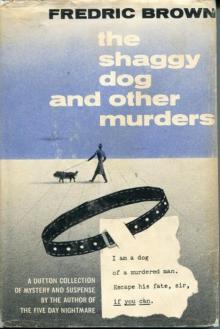 The Shaggy Dog and Other Murders
The Shaggy Dog and Other Murders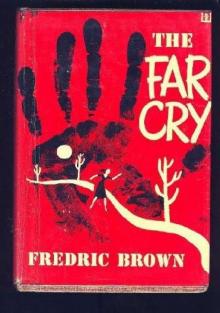 The Far Cry
The Far Cry Arena
Arena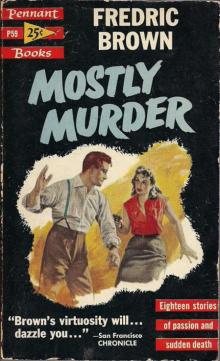 Mostly Murder
Mostly Murder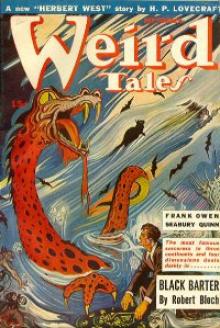 The Geezenstacks
The Geezenstacks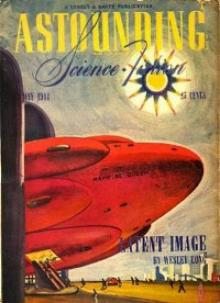 The Yehudi Principle
The Yehudi Principle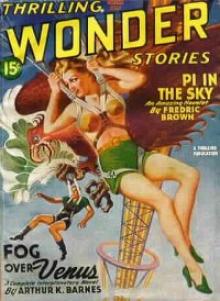 Pi in the Sky
Pi in the Sky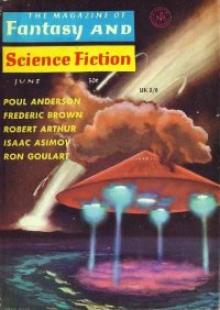 Eine Kleine Nachtmusik
Eine Kleine Nachtmusik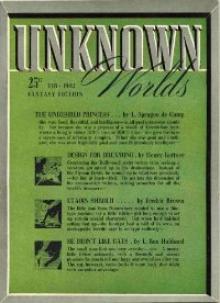 Etaoin Shrdlu
Etaoin Shrdlu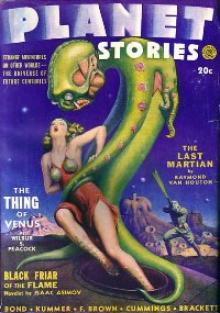 The Star Mouse
The Star Mouse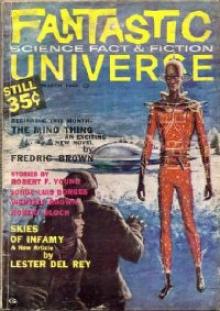 The Mind Thing
The Mind Thing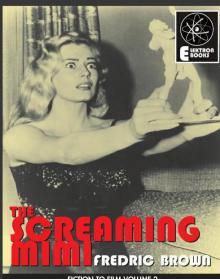 The Screaming Mimi
The Screaming Mimi The Fabulous Clipjoint
The Fabulous Clipjoint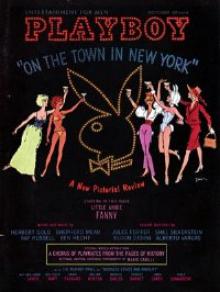 Puppet Show
Puppet Show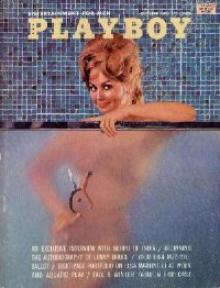 It Didn't Happen
It Didn't Happen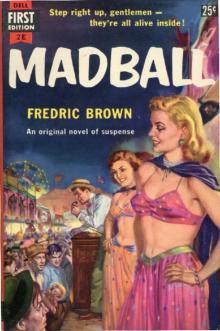 Madball
Madball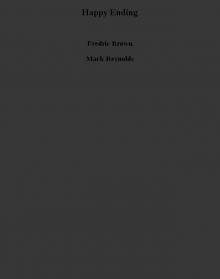 Happy Ending
Happy Ending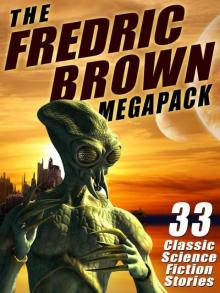 The Fredric Brown Megapack: 33 Classic Science Fiction Stories
The Fredric Brown Megapack: 33 Classic Science Fiction Stories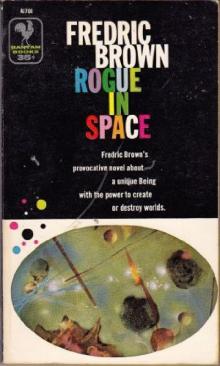 Rogue in Space
Rogue in Space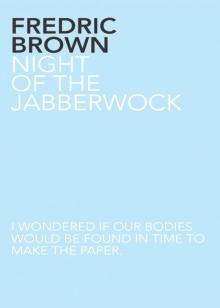 Night of the Jabberwock
Night of the Jabberwock The Dead Ringer
The Dead Ringer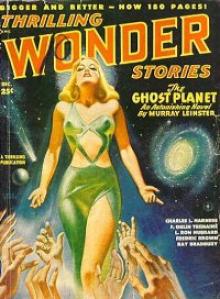 Knock
Knock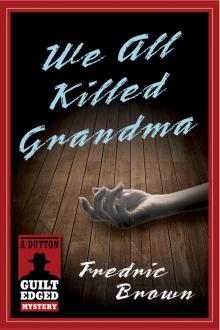 We All Killed Grandma
We All Killed Grandma Space On My Hands
Space On My Hands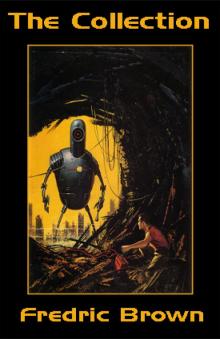 The Collection
The Collection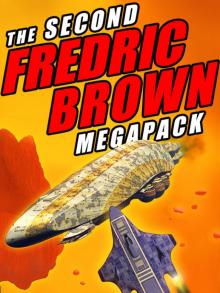 The Second Fredric Brown Megapack: 27 Classic Science Fiction Stories
The Second Fredric Brown Megapack: 27 Classic Science Fiction Stories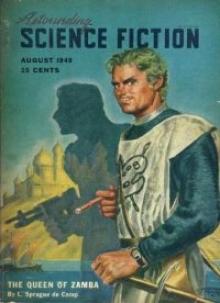 Letter to a Phoenix
Letter to a Phoenix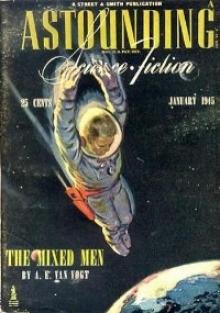 The Waveries
The Waveries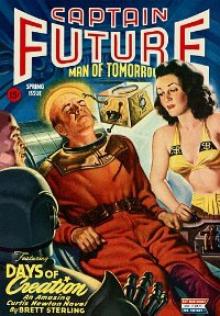 Nothing Sirius
Nothing Sirius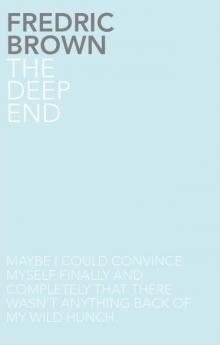 The Deep End
The Deep End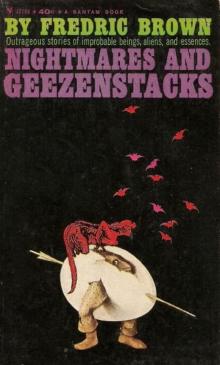 Nightmares & Geezenstacks
Nightmares & Geezenstacks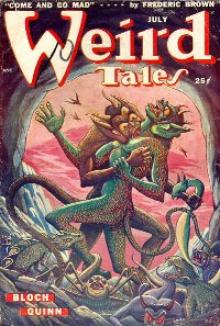 Come and Go Mad
Come and Go Mad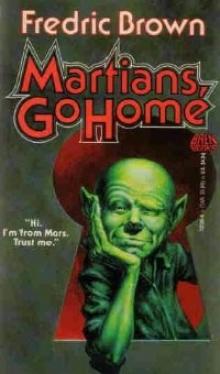 Martians, Go Home
Martians, Go Home